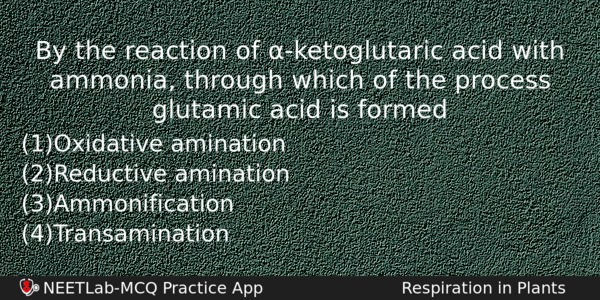| ⇦ | 
| ⇨ |
By the reaction of α-ketoglutaric acid with ammonia, through which of the process glutamic acid is formed
Options
(a) Oxidative amination
(b) Reductive amination
(c) Ammonification
(d) Transamination
Correct Answer:
Reductive amination
Explanation:
Reductive amination is the method of amino-acid synthesis in plants. In this method, α-keto glutaric acid reacts with ammonia (NH₃) and forms the amino acid called glutamic acid. The enzyme glutamate dehydrogenase enhances the reaction.
Related Questions: - Somaclonal variations are the variations
- Which elements are essential for the photophosphorylation
- Broca’s area in human brain controls
- Which one of the following substance is at its lowest lowel in fish food?
- Removal of RNA polymerase III forms mucleoplasm will affect the synthesis of:
Topics: Respiration in Plants
(184)
Subject: Biology
(4253)
Important MCQs Based on Medical Entrance Examinations To Improve Your NEET Score
- Somaclonal variations are the variations
- Which elements are essential for the photophosphorylation
- Broca’s area in human brain controls
- Which one of the following substance is at its lowest lowel in fish food?
- Removal of RNA polymerase III forms mucleoplasm will affect the synthesis of:
Topics: Respiration in Plants (184)
Subject: Biology (4253)
Important MCQs Based on Medical Entrance Examinations To Improve Your NEET Score
18000+ students are using NEETLab to improve their score. What about you?
Solve Previous Year MCQs, Mock Tests, Topicwise Practice Tests, Identify Weak Topics, Formula Flash cards and much more is available in NEETLab Android App to improve your NEET score.
Share this page with your friends

Leave a Reply